Join Our Telegram channel to stay up to date on breaking news coverage
The European Central Bank (ECB) has become one of the world’s top institutions regarding Central Bank Digital Currency (CBDC) research over the past month. With the agency looking to issue a digital asset soon enough, it is also carrying stakeholders along on the journey.
Collecting Areas of Interest
Earlier this week, the ECB officially launched a public consultation over its prospective digital asset. As an official document to that effect shows, the ECB sees a possible digital euro as a potential complement for traditional cash and even digital payment methods to improve the continent’s payment infrastructure.
The consultation paper calls on individuals, companies, academic organizations, trade unions, and non-governmental organizations within the Eurozone to provide their insights on the asset. It contains a survey where participants can record their views and share their thoughts on what the digital euro should be.
As the paper outlines, the CBDC is working on asset that will provide “strategic autonomy” to the Eurozone. Essentially, it could offer an alternative to the many digital payment services available, as the latter could undermine monetary sovereignty and financial stability on the continent.
The ECB is also working on an asset that will be able to operate in down periods – essentially, natural disasters, electricity outages, and more. A similar proposal was submitted by the Bank of Japan last week, as it explained in a submission that it was working on developing an asset that could remain functional in cases of “Force Majeure.”
As for the ECB, it asked participants to provide answers to several questions, including a ranking that shows that they believe should be the digital euro’s top priority. Options to the rankings include ease of use, privacy, access from any part of the Eurozone, and payment security.
All Systems Go for the Digital Euro
Along with the areas of interest, the ECB also asked participants to comment on the specific challenges they could foresee that would stifle their ability to use the digital euro. Respondents will also have to propose features that will spur adoption across the continent – especially for people with disabilities and the unbanked population.
The last choice sees respondents select between a digital euro with a central body that processes all payments and a digital euro that requires multiple intermediaries to do the same thing. The consultation appears to be a precursor to a full study that the ECB plans to conduct into a digital euro. Last week, the body confirmed that it would begin studies into its asset by next year – ironically, at the same time that the Bank of Japan posited in its filing.
Support for a digital euro has already been considerable across the continent. The continent’s top economies – including France, the Netherlands, Germany, and Spain – have already thrown their weight behind the asset, further spurring its potential. Although several issues still need working out, the European Union is on the cusp of making history as far as the financial industry is concerned.
Join Our Telegram channel to stay up to date on breaking news coverage


